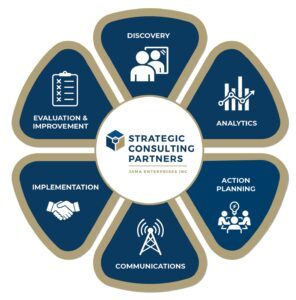Diversity, Equity and Inclusion in the Workplace
Feb 1, 2021 | Thought Leadership
What’s the WHY Behind Your Diversity, Equity and Inclusion Initiatives?
Nearly all large organizations have acknowledged and embraced the concept of Diversity, Equity and Inclusion (DE&I) as an organizational goal; but unless they understand the “why” behind their initiatives, the chances of success and sustainability are highly unlikely.
So as an organization, why do you want to put organizational capital into building an effective DE&I strategy? Is it to compete for talent? Retain talent? Increase innovation? Creativity? Productivity? Have a representative workforce?
Let Strategic Consulting Partners help your organization define the “why” behind your DE&I goals and tailor a successful, sustainable D&I strategy and framework. We will help you answer all your DE&I related questions (including but not limited to those presented below).
DE&I Questions that SCP Will Help Your Organization Answer
- What DE&I goals does your organization have, why are they important to the organization, and how are you measuring success?
- Are your DE&I goals inextricably linked to organizational performance and outcomes? (Hint: If not, their success and sustainability will be limited)
- Do you believe you are doing well with regard to DE&I in your organization?
- Would your employees agree – and how do you know?
- What DE&I challenges do you believe you may have now and in the future?
- What are you currently doing, or have you done in the past, about these challenges?
- How are you measuring the effectiveness of your DE&I goals?
- Does your organizational culture support diversity initiatives?
- Do your values – or does what you value – support inclusion initiatives? (Hint: If experience is valued above all – from recruitment to problem solving – your culture may impede inclusivity)
Strategic Consulting Partners will help you look beyond demographic data such as race, gender, age, national origin and other characteristics – what’s referred to as “identity diversity” – and delve into “cognitive diversity,” which refers to the ways that people react to uncertainty, approach problems, discuss solutions, create strategies to overcome challenges, and collaborate with fellow team members. Some diversity experts have found that groups with the greatest cognitive diversity complete tasks more quickly and more effectively than groups with the least cognitive diversity.
According to an article in Harvard Business Review (March 30, 2017), researchers Alison Reynolds and David Lewis “believe that this cognitive diversity is even more important than identity diversity in predicting whether teams will work together effectively.”
Business, Economic and Human Capital Imperatives for DE&I
Most organizations look at the demographic trends in hiring and evaluate their success along this lowest of common denominators, which starts to provide insights into diversity at the start of the human capital lifecycle. Others go a little further and assess the retention and promotion rates of their “diverse” workforce, which provide some initial insight into an organization’s level of equity and inclusivity.
The demographics around race, national origin, gender and other factors are important, of course. But if you are only measuring your success against these factors without truly understanding the “why,” you are missing out on an opportunity to propel your organization to the next level of effectiveness.
Highly effective organizations understand the imperatives for diversity, equity and inclusion – which include business, economic, and human capital imperatives, as described below.
Business Imperative for DE&I
- Several studies have demonstrated that diverse teams are more creative and innovative, and they perform better in problem solving than homogenous groups (The Difference: How the Power of Diversity Creates Better Groups, Firms, Schools, and Societies by Scott Paige; The Wisdom of Crowds by James Surowiecki)
- A recent study at the Intelligence Advanced Research Projects Activity demonstrated that an untrained diverse group was 30% better at predicting outcomes than CIA professionals
- Diversity in workforce and leadership results in better decision-making (better outcome given the alternatives; expectations exceeded) (Center for Creative Leadership) Research Network and Harvard Business Review)
Economic Imperative for DE&I
- Highly diverse, engaged organizations have 41% less absenteeism and 24% less turnover (turnover costs can approach 75-100% of salary being replaced)
- Diverse organizations have more engaged employees, and are 17% more productive than less diverse organizations with lower engagement scores (Gallup Report on State of the American Workforce)
- Racial and gender diversity are positively associated with higher productivity, quality and economic benefits (Workforce Diversity and Productivity by L. Barrington)
Human Capital Imperative for DE&I
- Diverse workplaces with culturally competent workforces have the highest employee engagement (Gallup Report on State of the American Workforce)
- Employee engagement is a valid predictor of organizational retention and productivity (OPM Office of Diversity and Inclusion)
- “Inclusion is the source of higher performance, not just the presence of diversity” (Diversity Action Network)
- Talent is attracted to organizations with high employee engagement
- A diverse and inclusive workforce is crucial for organizations that want to attract and retain top talent
- “It’s the difference between counting heads and making heads count.” (Emily Vargas)
The deliberate approach that Strategic Consulting Partners follows in analyzing clients’ “current state” of workplace diversity (identity as well as cognitive) and the “ideal state” they strive to achieve is built upon the framework presented below. This framework has for many years guided SCP’s clients in developing and implementing DE&I strategies that enable them to achieve and sustain a diverse, equitable and inclusive culture.
The SCP Diversity, Equity and Inclusion Framework

Diversity, Equity and Inclusion Starts with Senior Leaders!
Learn more about our DE&I work or contact us to share your challenges and hear how we can help you achieve the diverse, equitable and inclusive workplace culture that will ensure high levels of employee engagement, retention and productivity.




